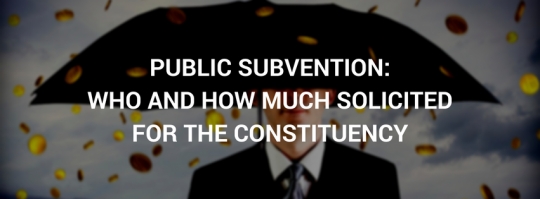Very often MP’s boast around in social networks and in meeting with the electorate that they “brought” money to their constituency. We decided to clarify where this money comes from. In our research we came across Resolution of the Cabinet of Ministers # 395 on providing subvention in 2016 from the state budget for social and economic development of some territories, which we analyzed. Besides, we found out what MP’s actually do to solicit this money.
We made three main conclusions:
- The process of issuing subvention from the State Budget is quite politicized.
- The mechanisms and procedures of elaborating and approving the list of objects or activities to be supported with subvention, are not transparent and comprehendible.
- The distribution of funds is unbalanced from region to region.
Let’s proceed to more details.
What does subvention mean
Subvention is a form of targeted financial assistance provided by the state to local self-governments. Each year such financial assistance is planned for in the State Budget of Ukraine, however, the amounts and the targets of public subvention may change year to year. Usually the budget provides for the following subventions:
- health;
- education;
- for AH infrastructure;
- for re-imbursement of the difference in the actual costs of utilities provided to the population;
- to implement activities aiming at rural healthcare development;
- for social and economic development of some territories.
In addition to that, the money of State Regional Development Fund is actively used locally.
Because of unclear mechanisms of fund distribution, the subvention “for social and economic development of some territories” was the most interesting for the purpose of our research. Therefore, we studied the relevant Resolution of the Cabinet of Ministers # 395 dated 24 June 2016. To be more exact, we studied the distribution of funds according to Addendum 3 to the mentioned Resolution defining quite an extensive list of 3 714 target objects (activities) amounting to 2 452 792 671 UAH.
Why 2016, why not 2017? Firstly, because the calendar year has finished, and the expenditures amounts are final and will not change. Secondly, all procedures related to spending the funds, including bidding, and the activities covered by the budgets, are completed. And finally, thirdly, PR-campaigns of those persons, who, as they put it, “solicited”, “lobbied”, “brought” or “initiated’ these subventions, are over and left behind in the internet space.
Measure it three times, cut it once
How is public subvention distributed? This is not an easy question. The official regulatory documents do not provide a clear answer. The Resolution in question states: “The lists of objects and activities to be funded in 2016 at the cost of the subvention for social and economic development of separate territories, are formed and approved by relevant local state administrations, executive self-government authorities”. The Cabinet of Ministers confirms this information in response to information inquiries. It refers us to resolution issued by the Government of Azarov on 6 February 2012 # 106 “On approving the Order and conditions of issuing subventions from the State Budget to local budgets to conduct activities aimed at social and economic development of some territories”, which, although amended, is still active.
The Resolution defines the Ministry of Finance as the main entity to distribute the subvention, explains which activities and objects can be the subject of subvention, and stipulates the conditions of providing such subvention. However, the document does not mention the mechanism of funds allocation and distribution.
Besides, until recently this document did not define the mechanisms of MP's participation in subvention allocated, apart from agreeing the subventions with the Parliamentary Committee on budget. However, this did not mean that MP's were not involved in the process. Thus, only on 27 September 2017 the Parliament finally amended the mentioned Resolution “on the Order and conditions”, and the proposals of MP's on subvention allocation were eventually institutionalized. In 2017 MinFin established a special committee on subvention allocation in which no less than 50% of seats were reserved for the members pf the Parliamentary Committee on Budget.
Thus, allocation of subventions officially became a political process, but unfortunately, this did not make it more transparent.
To whom Cabinet of Ministers gave money and how much
The analysis of the “list of objects (activities) financed in 2016 at the cost of subvention to local budgets from the state budget for the activities aimed at social and economic development of some territories” also provides non-reassuring conclusions. Firstly, it is absolute lack of transparency of the process and, secondly, lack of balance in cost distribution by oblast.
Thus, two neighboring oblasts comparable by population and surface area – Ternopil and Ivano-Frankivsk – received absolutely different amounts of subvention: Ternopil Oblast received 31 mln UAH, while Ivano-Frankivsk Oblast – 169 mln UAH, which is 5.5 times more.
Recognizing the “significant involvement” of MP's in the process of subvention planning and allocation, we monitored how the funds were distributed among constituencies. The findings were: 27 constituencies received over 20 mln UAH, Constituency 61 received 15 to 20 mnl UAH, and 29 more constituencies received 10 - 15 mln UAH. At the same time, over 40% of the constituencies did not receive adequate state subvention. Thus, 38 constituencies received less than 10 mln UAH, and 43 constituencies did not receive anything at all. We believe it is a good evidence of uneven budget distribution and open involvement in the process.
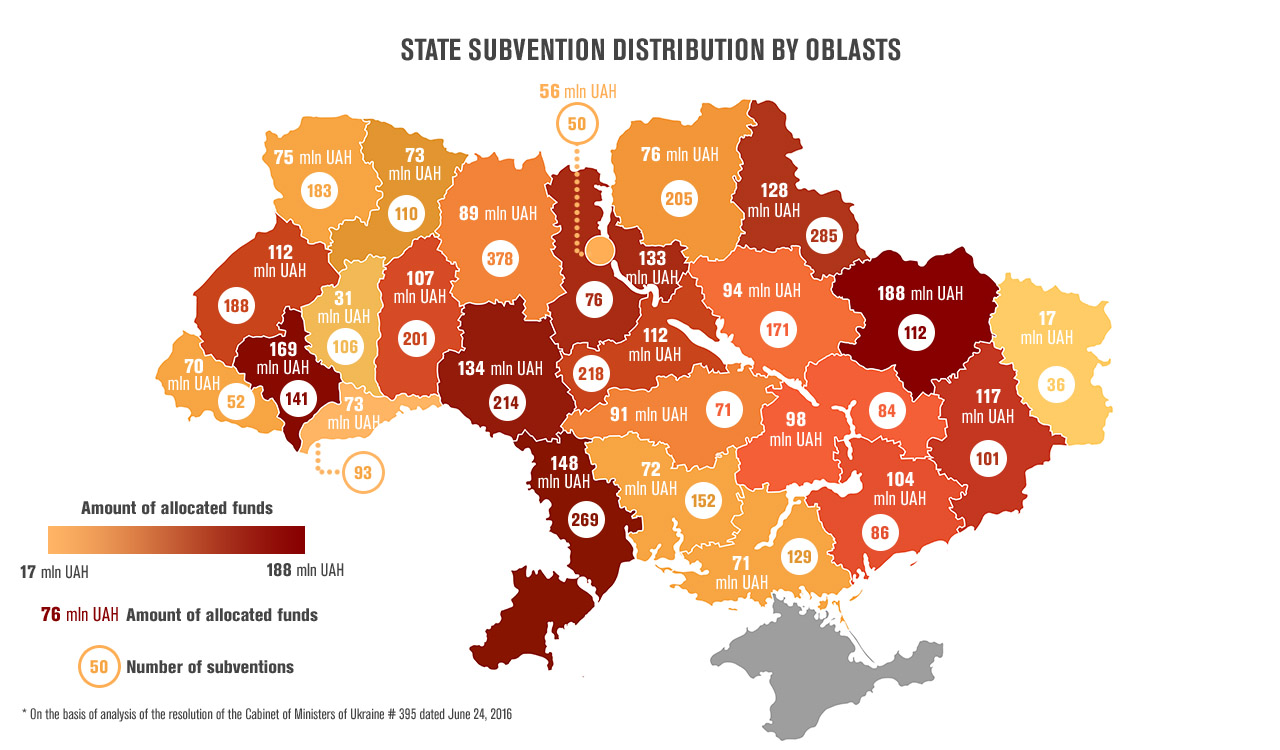
The election constituencies of 8 MP's received subventions exceeding 30 mln UAH. For example, Constituency 168 of deputy Valerii Pisarenko in Kharkiv Oblast received subventions to the amount of 68 mln UAH for 3 major infrastructure projects. This is the highest number in Ukraine. On the second place of this conditional ranking – Constituency 160 of deputy Ihor Molotok, with 44 mln UAH allocated for 117 activities. The last of the leading three is Constituency 97 in Kyiv oblast of MP Pavlo Rizanenko, with almost 40 mln UAH allocated for 19 projects.
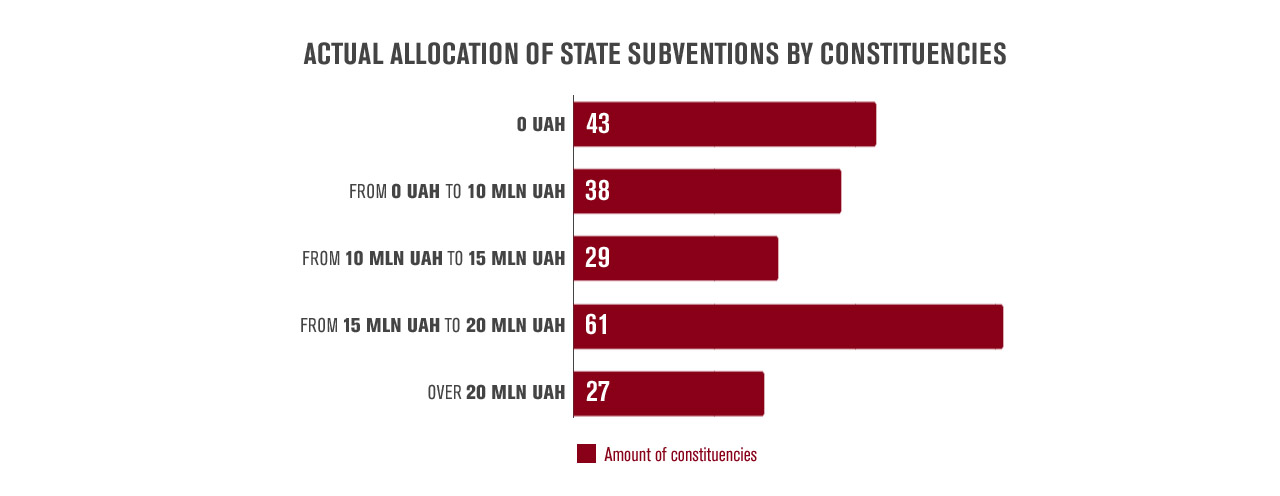
Three constituencies of Ivano-Frankivsk oblast are also in the top of the list of public subvention recipients: Constituency 86 (Anatolii Dyriv), Constituency 83 (Oleksandr Shevchenko) and Constituency 88 (Yurii Tymoshenko). They received subventions to the amounts of 35 to 40 mln UAH. The last places in the eight “champions” chart are shared by Constituency 50 of MP Evhen Heller (Donetsk Oblast) and Constituency 99 of MP Kostiantyn Yarynich (Kirovohrad Oblast) – 34 mln UAH each.
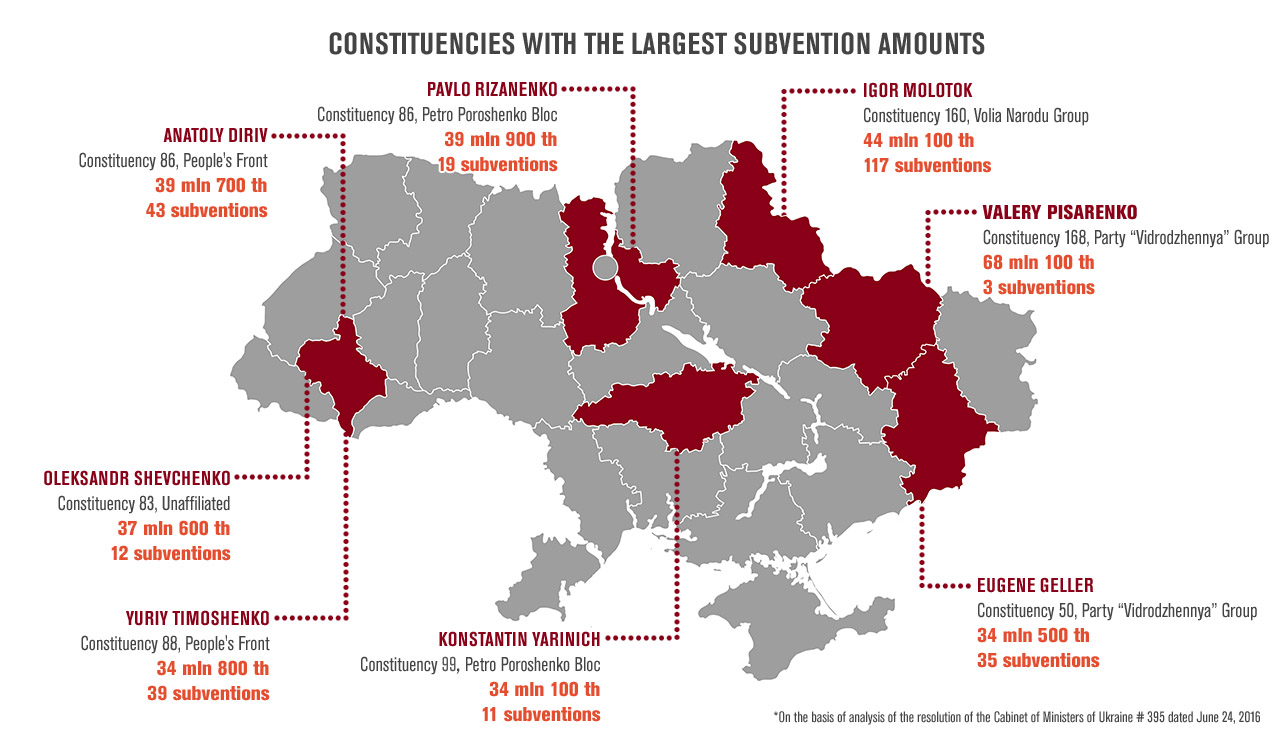
This allegory is illustrative to the phrase “Some get it all, others get nothing.”
Which faction to join?
The Civil Network OPORA analyzed the disbalance in subvention distribution by parliamentary factions.
Major recipients of subvention both in terms of amount and the quantity of subvention were 72 majority constituencies of Petro Poroshenko Bloc – 1837 subventions totaling to 1.62 bln UAH. On the 2nd place – 26 constituencies of the MP's from Vidrodzhennia group, with 31 subventions amounting to 446 mln UAH.
A little more than 322 mln UAH went to 18 majority constituencies of “Narodnyi front” faction, while Constituency 41 of independent MP's received subventions of similar total amount – 290 mln UAH. MP's of 19 election constituencies of “Volia narodu” faction were able to use 239 mln UAH.
Despite significant number of majoritaries (16), the constituencies of the “Opposition Bloc” faction actually did not receive subventions – only 46 mln UAH. Half of these funds, by the way, went to Constituency 47 represented by Yurii Soloda and # 57 represented by Serhii Matviienkov, both located in Donetsk oblast.
Four majority constituencies represented in Parliament by Batkivschyna deputies, received only 26 mln UAH, and 2 constituencies of Samopomich faction received only 5.5 mln UAH (the entire amount went to Constituency 116 of Iryna Podoliak).

Children and Youth First
Though Resolution of the Cabinet of Ministers “On approving the Order and conditions of issuing subvention from the State Budget” stipulates certain subvention allocation, detailed analysis of the objects (activities) shows absolutely different ways of state funds use. Thus, even within one region or constituency the funds could be allocated both for large infrastructure objects, overhaul repairs of hospitals, roads or schools, and for absolutely unreasonable purchases like mincing machine, stage outfit or construction of playground. And if in the first case funds allocation sounds absolutely logical, in the latter one we wonder if they are serious.
At present it is impossible to give an accurate answer why Cabmin doesn’t follow its own resolutions and orders. Or we have to blame so-called “proposals” of the MPs? Civil Network OPORA is still waiting for the copies of all MPs’ “wishes” which were submitted to Cabmin. However, even now we can state that elected officials influence the most allocation of state subventions.
But “let’s return to our muttons”: we split the funds according to categories of the objects to which they were allocated. In such a way we can describe better funds allocation within certain constituencies.
In 2016 education institutions were taken the most care of – 987 mln UAH of subvention was allocated for them. Hundreds of schools, lyceums, nursery schools and different non-school education structures used such right to public funds 1 782 times.
Constituency 130, Mykolaiv oblast, was the “luckiest”. Due to the efforts of Andriy Vadaturskyi, deputy elected under majority system, windows were replaced in about one hundred schools for the total sum of over 13 mln UAH. Similar situation can be observed in constituency 198 of Serhiy Rudyk, Cherkasy oblast – over 9 mln UAH and 77 subventions for education institutions for windows replacement, overhaul repairs and equipment procurement.
Ex-speaker of the Verkhovna Rada, present deputy elected under majority system Volodymyr Lytvyn “didn’t trail far behind” as well. So, for educational institutions of his Constituency 65, Zhytomyr oblast, over 10 mln UAH was allocated for a range of 74 activities and works: from reconstructions and overhaul repairs to procurement of furniture, printers, boilers, electric cookers and even music systems.
And, pupils of Serhiy Labaziuk constituency had, probably, the “biggest day”: about 5 mln UAH was allocated only for computers procurement to schools of constituency 188 (Khmelnytskyi).
In total education subventions amounting to over 5 mln UAH were allocated to each of 83 constituencies.
Almost three times less public funds were earmarked for 379 healthcare institutions – 316 mln UAH.
In healthcare the largest amount of funds was allocated for constituency 99, Kirovohrad oblast – 28,5 mln UAH subvention was allocated for 4 institutions. It should be noted that the deputy elected under majority system of this constituency Kostiantyn Yarynich is a member of health committee.
The least “lucky” in receiving subventions were culture centres, libraries, museums and other social and cultural institutions – only 169 mln UAH and 292 subventions accordingly.
The most funds (13.5 mln UAH) in this area was appropriated for construction of “Youth Leisure Centre” in Salhany village, Odessa oblast. By the way, these are the only subventions received by Vitaliy Barvinenko constituency 141 in 2016.
In terms of number of subventions for social and cultural institutions the leader is again Volodymyr Lytvyn constituency 65 – 28 culture centres can now impress others with their fresh repairs, equipment or “stage outfit for amateur groups of the culture centre”.
During distribution of state subventions housing and municipal services, landscaping and infrastructure development were not left aside. 585 subventions amounting to 559 mln UAH were allocation in this area. Almost all objects underwent repairs.
The largest amount of these subventions was directed to Hennadiy Chekita constituency 134 in Odessa, where 59 overhaul repairs were done in housing and municipal services sphere amounting to 12,5 mln UAH. In comparison, the same amount was earmarked for constituency 168 in Kharkiv only for one activity – reconstruction of recreation area in Taras Shevchenko Garden. In addition, more 27.5 mln UAH was allocated to this constituency, which interests are represented by Valeriy Pysarenko in the Rada, for reconstruction of the local zoo.
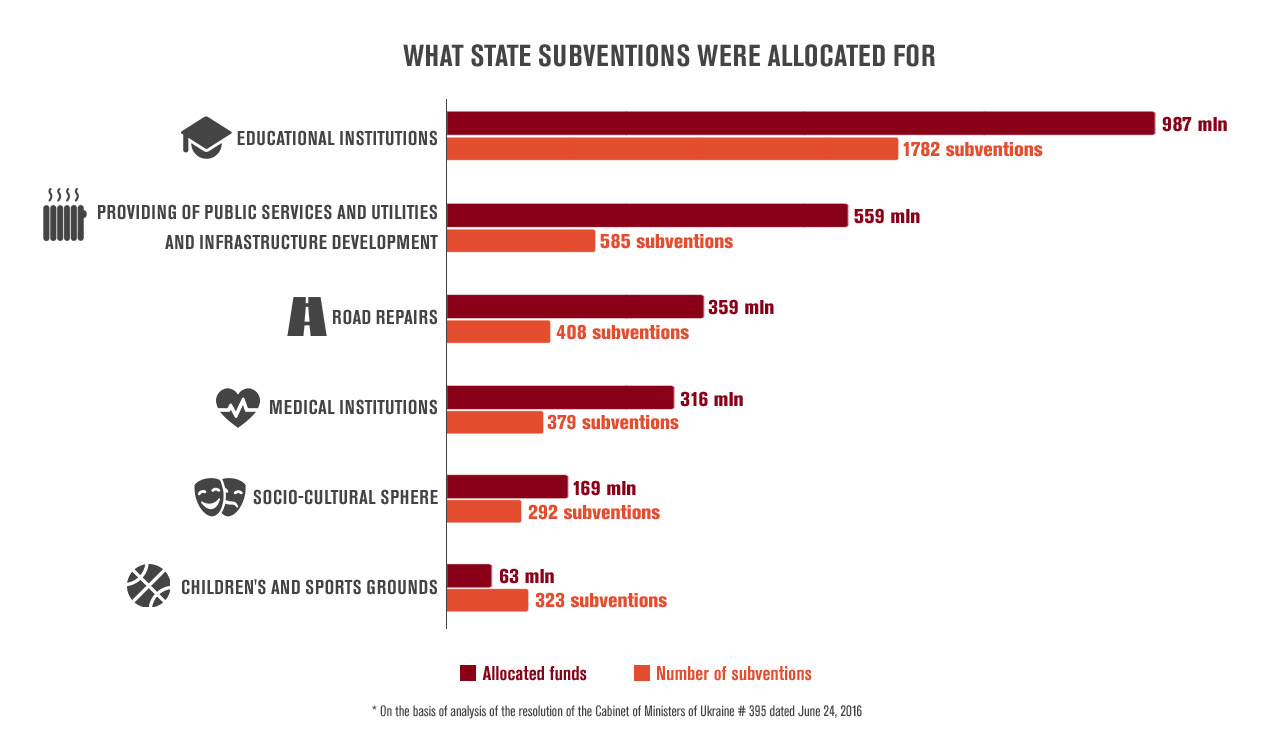
Another large infrastructure project was supported in Kyiv oblast. So, over 23.5 mln UAH was directed to Pavlo Rizanenko constituency 97 for “waste treatment facilities in Baryshivka settlement”.
Almost 24 mln UAH was received by Mykola Fedoruk constituency 201 for overhaul repairs and equipment procurement for the Chernivtsi International Airport. In its turn, over 21 mln UAH was “drawn” by the deputy elected under majority system from constituency 200 Anton Yatsenko for Taras Shevchenko Park reconstruction in Uman city. By the way, one of the biggest fountains in Ukraine was opened in the park.
And constituency 177, which interests are represented in Rada by Viktor Ostapchuk, received over 15 mln UAH of subventions for water pipeline reconstruction in Isium city, gas supply in Pisky-Radkivski village and Kurylivka village, water pipeline reconstruction in Kupiansk city.
Public funds were also actively spent for road repairs. Over 359 mln UAH was allocated for such activities.
The works of the largest scale were performed in above-mentioned Valeriy Pysarenko constituency, where almost 28 mln UAH was earmarked for Pavlivskyi square reconstruction.
Active roadworks were also performed in Zakarpattia oblast. So, Pavlo Baloha Constituency 71 received 24,5 mln UAH of subvention. All of them were directed for road repairs.
Asphalt works wave also reached Ivano-Frankivsk city – 18.5 mln UAH for “overhaul road patching” in Oleksandr Shevchenko constituency 83.
24 constituencies in total can boast of having their roads repaired for the sum over 5 mln UAH.
Out of almost 2,5 bln UAH of state subventions “some” 63 mln UAH was allocated for construction of 323 play and sportsgrounds. Children of constituency 19, Volyn Oblast, received most of such “gifts”. In constituency of the deputy elected under majority system Ihor Huz 80 play and sportsgrounds were constructed with the total cost of almost 6,5 mln UAH.
Oleh Dmytrenko constituency 210, Chernihiv Oblast, was also “lucky”. 60 “children play and sportsgrounds” were purchased there for 12 mln UAH. By the way, in the neighbouring constituency 209 of Oleksandr Koloda more 34 play and sportsgrounds were installed.
Hennadiy Chekita (Constituency 134, Odessa), Serhiy Rudyk (constituency 198, Cherkasy Oblast) and Ihor Molotok (constituency 160, Sumy oblast) also “didn’t forget” about children. In their three constituencies 80 works were performed for repair and installation of play and sportsgrounds with a total cost of 8.5 mln UAH.
To sum up, state subvention funds were very often allocated for projects of absolutely different nature and problems. And this fact, in our opinion, is one of the biggest challenges for subvention system for social and economic development of certain territories. In fact, this means that there is no transparent mechanism of proposed projects’ evaluation, and it is very likely that they are approved through “negotiations and agreements”. Accordingly, in this system construction of 100 playgrounds will always equal to hospital reconstruction as long as you manage to “make a deal”.
You won’t be yourself if you don’t boast and report
A Ukrainian proverb says – “What has been done has been spoken about”. Probably, this is why MP's do their best to tell around about the funds they attracted for the constituency. They use such words as “solicit”, “attract”, “facilitate allocation”, “bring”, “I initiated”, “with my support” in their reporting, as if trying to remind the electorate “whom they must thank” and “who they should vote again for” in the next elections.
Thus, Serhii Rudyk, Member of Parliament from Cherkasy oblast (Constituency 198), posts on his Facebook page: The funds of the targeted subvention which I solicited last year from the State budget, were spent for window replacement in two village schools, Yurchynka cultural centre, and for constructing a playground for children”. In another post in social networks, the MP's added: “Thus, my input in construction of playgrounds for the children of Cherkasy rayon is 7… We continue working.” These posts are illustrated with photos depicting “the inspection” and the ceremony of cutting the ribbon.
Another Member of Parliament also reports about the opening ceremonies. Member of Parliament Ihor Huz (Constituency 19, Volyn oblast) posts on his personal Facebook page: “66 playgrounds and sports grounds for active recreation of children opened in Ivanychivka, Liuboml and Volodymyr-Volynskyi rayons. They were funded at the cost of last year public subvention at the proposal of MP's Ihor Huz. Each playground costs about 80 thousand UAH. Member of Parliament Ihor Huz and his assistants participated in the opening ceremonies”. The Member of Parliament comments: “For my constituency, play- and sports grounds were the priority for the last year public subvention. We managed to cover many villages, so now kids have a recreation zone: they play more in the open air, rather than spending time in front of the TV screen.”
Parliament Member Anton Yatsenko (Constituency 200, Cherkasy Oblast) does not downplay his input in funds allocation for the constituency either: “I facilitated cost allocation from the state budget amounting to 21 mln UAH for the reconstruction of Taras Shevchenko garden park.” The member of Parliament emphasized: “This initiative was included in my pre-election campaign in 2014, and I completed it, as I promised.”
Member of Parliament from Sumy oblast Ihor Molotok (Constituency 160) also actively reports about attracting funds for social and economic development from the state budget. The Deputy is convinced: “It is not the political quarrels but only targeted work for the benefit of the city that will result to positive change!”
MP's of majority constituency from Poltava oblast Ihor Bublyk (Constituency 145) also tells about deputy’s assistance. He frequently uses the words “with my assistance”, “with my support” regarding repair of communal property or procurement of equipment for schools. However, he forgets to mention that the activities are funded at the cost of public subvention.
Actually, we can find plenty reports of majority constituency deputies about them “attracting” subventions. The reports of the Members of Parliament elected on behalf of certain parties, are of more interest. Thus, the official web-site of Dnipropetrovsk territorial unit of Petro Poroshenko Bloc published the following materials: “Multifunctional sports arena “Trudovi Rezervy” incorporates a soccer field, running course, training fields for track-and-fields and basketball athletes. Reconstruction of the stadium was initiated by Andrii Pavelko, the President of Football Federation of Ukraine, MP's from Petro Poroshenko Bloc. Due to his intervention, it became possible to transfer the object to communal property from the ownership of the Ministry of Education. Being the head of Parliamentary Budget Committee, Andrii Pavenko achieved allocating of the budget funds for the reconstruction of the stadium.” Therefore, we can notice the fact of considering the proposals of subvention distribution of the Member of Parliament elected on behalf of a certain party. With single but important remark that this MP is the Head of the Budget Committee of the Parliament.
Finally, to conclude on the MPs’ reports, we would like to cite a majority constituency MP who wished to remain anonymous: “Someone really directs funds for significant infrastructure projects, but some deputies look at that through further election campaign. Because then they will have to come to each village, each school, each club, each kindergarten to say: I was the one who bought you this TV-set, replaced these windows, built playground, patched the hole in your roof, all over the constituency.”
What do the deputies say?
Representatives of the Civil Network OPORA appealed to people's elected representatives for comments on the distribution of state subventions, but did not hear similar statements from them. Thus, the MP's shared different opinions on the need for deputies’ participation in the process of allocation of subventions. In addition, the parliamentarians also discorded with on the peculiarities of procedures and mechanisms of funds’ allocation for the implementation of measures aimed at socio-economic development of certain territories.
MP's Oleksandr Livik (Constituency 131, Mykolayiv Oblast) states: “It is not a function of a deputy to engage in economic activity or seek to allocate funds, the main deputy’s function is legislative one”. However, at the same time, the parliamentarian does not hide the fact that he enjoys the right to a deputy's appeal regarding the allocation of funds, therefore he emphasizes: “If a deputy should engage in the relevant activities, it has to be as transparent and legally regulated as possible.”
Olexandr Kirsh (Constituency 169, Kharkiv Oblast) disagrees with his colleague: “This subvention is very necessary. I'll explain why. People often apply to my office, especially with regard to housing and communal services issues. So what should I do – should I simply write an appeal to local authorities and hope our question will come into notice? But they have a title plan of work as well, and even if they wish, they cannot always include specific addresses to this plan. Therefore, I gather all the office requests, systematize them and make proposals to use this subvention in order to address the issues of people who came with the request. The deputy must definitely have the opportunity to solve the problems of the constituency he was elected from. Otherwise, why should we need constituencies at all?”
Volodymyr Parasyuk (Constituency 122, Lviv Oblast) comments on political bias in funds allocation as follows: “If you vote for the state budget, you get a “bonus” in the form of allocating funds to the constituency. If you do not vote, you do not get anything. You can write piles of letters and requests to the ministries, collect signatures with citizens in order to allocate funds to repair the road or some other infrastructure objects. This is a way of manipulating and pushing the pro-government majority. Therefore, allocation of subventions to the constituency is the price of political bidding for the state budget.”
In turn, Maxim Burbak, the head of “Narodnyi Front” faction elected under majority election system from the 204th constituency (Bukovina), denies such allegations: “The statement that subventions constitute a bribe for a MP's is not true. However, a parliamentarian can act as an instrument for communicating information to the Cabinet of Ministers on the importance to finance an object. But in fact, when the issue of subvention funds allocation is under consideration, and the government reviews proposals, the advantage is firstly given to those objects put into service in the current year; secondly, the co-financing of projects with local budgets is welcomed, because if the community has allocated funds to finance the project, then it will control both the distribution of the money and the quality of work performed, and thirdly, the very quality of the project preparation is very important for receiving subventions, since they are often presented with an outdated design and estimate documentation.”
MP Roman Matsola (Constituency 190, Khmelnytskyi Oblast) also denies the existence of preferences for specific deputies: “As for any preferences or quotas, I have not heard about that. The funds raised from the state budget are the result of the established cooperation between residents, local self-government bodies, state authorities and myself as a MP's .”
Igor Guz, MP from Volyn (Constituency 19), supports this opinion: “In fact, you can use many opportunities from different ministries. And preferences are received only by those who are constantly looking for these opportunities. After all, funds can only be attracted if there is a good cooperation with the ministries, when there is a willingness to submit a timely reasoned and detailed proposal for financing.”
MP Andriy Vadatursky (Constituency 130, Mykolayiv Oblast) did not think over procedures for allocating funds for social and economic development prior to the conversation with representatives of OPORA. “Up to current time, I did not even think about the issue that someone’s constituency is given more money, and someone’s less. I am not competing with anyone, because we are doing one thing. But I am constantly working in the constituency, elaborating projects, collecting signatures ... And finally, in the Cabinet of Ministers I am struggling to allocate funds for each of these projects, proving their importance. The one who shows initiative and wants to help, will always get assistance as well.”
In turn, Yuriy Levchenko, a majoritarian MP from the 223rd constituency (Kyiv) and a member of the Budget Committee, expressed a rather critical position: “Definitely, when you vote "correctly" at the meetings of the Budget Committee, and then in the hall, you receive certain preferences in funds’ allocation. And here we are talking not only about money for social and economic development ... Personally, I have never written proposals on subventions to the Cabinet of Ministers, since I was almost straightforwardly informed that they would not be supported as I often vote against and criticize many initiatives.” In addition, the deputy adds: “In addition to the issue of frank PR at budget funds, the issue of personal enrichment of deputies is also very important. Certainly, I do not have detailed statistics, because it is very complicated, but, in my opinion, not less than 80% of the corresponding works are carried out by the firms aligned with the relevant MP's .”
What to do and how to live with it
Undoubtedly, it is possible to “put a nail in the coffin” of deputies' subventions for a very long time. Though we all need to perfectly understand the fact that “nobody will saw off the bough on which one is sitting”. The system of “squeezing out” funds to constituencies has existed for many years. It will continue to exist, especially taking into consideration the by now official involvement of MP's in the process of allocation of subventions through the submission of proposals.
Thus, what should indifferent community do? The primary prescription may be as follows. First of all, it is necessary to demand full transparency of the mechanisms and format of proposals for the list of objects (activities) that are planned to be financed through a subvention for the implementation of measures aimed at socio-economic development of certain territories. Then the relevant list of proposals should be evaluated qualitatively according to clearly defined criteria, with the Cabinet of Ministers supporting only the best projects. At the same time, the public should demand the uniform allocation of subvention funds over regions (constituencies) of the country. And only after this will the activists have real opportunities to control the targeted use of state subventions and eliminate corruption schemes.
Otherwise, there is a great risk that all these playgrounds, windows, doors, electric stoves or meat mincers purchased for our money will continue to be a so-called “legal buckwheat” for potential voters.
P.S. The data used in the material regarding the allocation of funds over the deputies' constituencies, are not made public by the Cabinet of Ministers of Ukraine, therefore was assembled by us using a computer approach. This fact could affect data completeness and accuracy.
The material is prepared under USAID's Program “RADA: accountability, responsibility and democratic parliamentary representation” implemented by the Eastern Europe Foundation and its partners.
Map: https://rada.oporaua.org/mapa-subvencii-2016
Dataset: https://github.com/OPORA/rada/tree/master/subventions
Translated by ULEAD with Europe.
For comments, please, contact:
Andriy Savchuk, the Civil Network OPORA Analyst on monitoring the work of parliamentary committees
tel.: 066 29 28 784
e-mail: [email protected]
